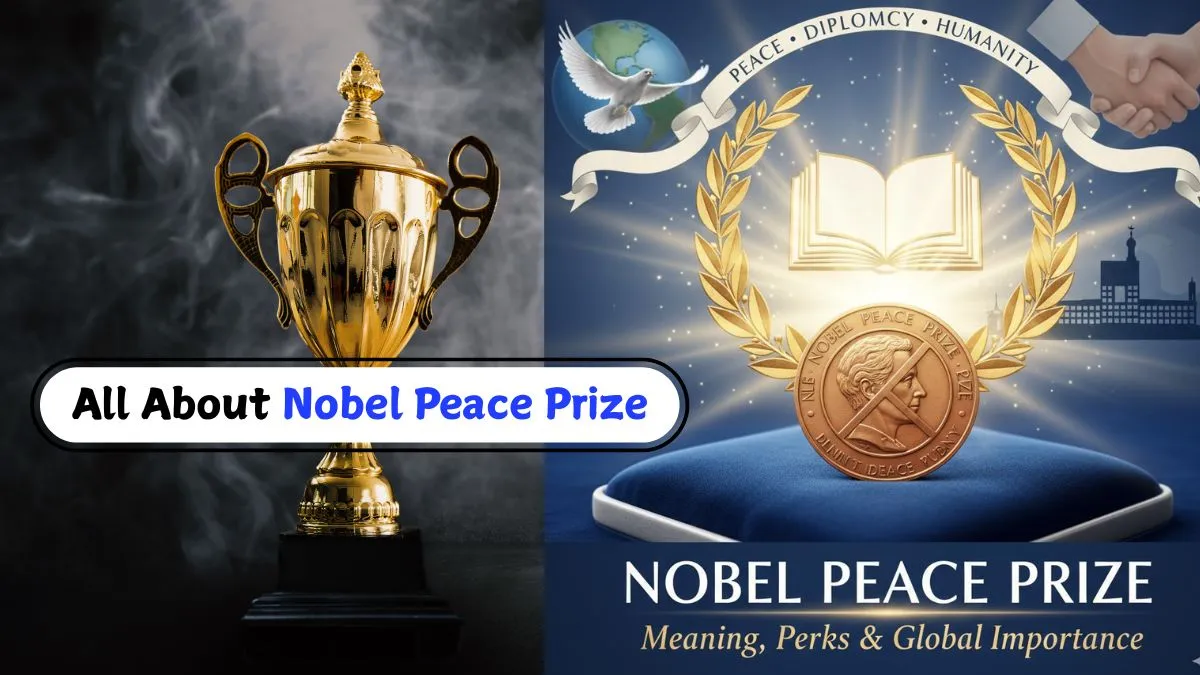- By Aditi Priya Singh
- Tue, 14 Oct 2025 06:55 PM (IST)
- Source:JND
All About Nobel Peace Prize: Each year, the world's focus shifts to the Nobel Peace Prize, one of the most prestigious and inspirational international awards. It recognizes people and organizations who put forward endless effort to promote peace, settle disputes, and enhance lives; it is a symbol of humanity, bravery and hope. The Nobel Peace Prize rewards people and groups that are committed to improving and protecting the world, including humanitarian organizations and famous leaders.
However, this prestigious award has a deeper meaning and a fascinating history that go beyond the lavish ceremony and global acclaim. What started it? The winners are chosen by whom? And aside from the honor, what do recipients really gain?
Donald Trump Is Nominated For Nobel Peace Prize 2025 by Pakistan's PM
Recently, Pakistan’s Prime Minister Shehbaz Sharif nominated former U.S. President Donald Trump for the Nobel Peace Prize 2025. The nomination highlights Trump’s role in promoting peace initiatives during his tenure either from being a mediator between India and Pakistan to Russia-Ukraine and Israel-Palestine and Gaza's disputes, according to the PM. This move has attracted global attention and debate over the criteria and significance of the nomination.
Check Video;
watch Meloni as Pakistan's Sharif fluffs Trump for next year's Nobel pic.twitter.com/yZxQt4o2IZ
— Aaron Rupar (@atrupar) October 13, 2025
Now let's explore the history, importance, and benefits of the Nobel Peace Prize, an honor that has inspired generations to strive for international harmony, justice and peace.
What Is The Nobel Peace Prize?
The Swedish inventor, scientist, and philanthropist Alfred Nobel established five prizes in his 1895 will, including the Nobel Peace Prize. It is awarded annually to people or groups that have significantly advanced world peace and conflict resolution.
Unlike other Nobel Prizes, which are presented in Sweden, this one is presented by the Norwegian Nobel Committee, which is headquartered in Oslo, Norway.
Why Nobel Peace Prize Is Given?
The Nobel Peace Prize is awarded to those who:
* Work toward ending wars and violent conflicts.
* Promote human rights and democracy.
* Encourage international cooperation and disarmament.
* Contribute to humanitarian or social causes that bring stability and equality.
Well, It is about not just about preventing war but fostering peace via communication, empathy and equality.
Perks And Privileges Of The Nobel Peace Prize
In addition to international recognition, receiving the Nobel Peace Prize has several specific benefits.
1. Monetary Reward: The winner gets a monetary award, which in 2025 would be roughly 11 million Swedish kronor, or $1 million USD.
2. Gold Medal: A prestigious 18-carat gold medal is given on which Alfred Nobel’s image is engraved.
3. Diploma: A beautifully designed certificate detailing the reason for the award.
4. Global Recognition: The laureate's work and message receive support and attention on a global scale.
5. Increased Influence: Nobel winners often gain a stronger platform to push for policy changes and inspire action.
The Global Significance Of The Nobel Peace Prize
More than just a prize, the Nobel Peace Prize is a symbol of humanity's hope. It serves as a reminder to the world that understanding, communication, and perseverance can lead to peace.
Organizations like the United Nations and well-known recipients like Mother Teresa, Nelson Mandela, and Malala Yousafzai have used this recognition to inspire millions of people around the world and further their missions. Every winner turns into a spokesperson for peace, demonstrating that one person or concept can genuinely make a difference in the world.
Famous Indians Who Is Recipents Of Nobel Peace Prize
Some Indians have received the Nobel Peace Prize in recognition of their outstanding contributions to peace and humanity. For her efforts to help the sick and impoverished, Mother Teresa was awarded it in 1979. The 2014 winner, Kailash Satyarthi, inspired millions worldwide with his work to fight child labor and protect children's rights. The 14th Dalai Lama, Tenzin Gyatso, was awarded the Nobel Peace Prize in 1989 for his nonviolent struggle for the freedom of Tibet and his efforts to promote global peace and human rights.

